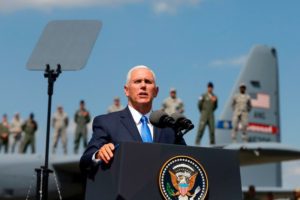Far from the chaos and cacophony of Washington’s unending debate over Russia policy, Vice President Mike Pence has been delivering a remarkably consistent message on a trip to Eastern Europe this week — praising old alliances and reaffirming America’s commitment to defend democratic nations against those countries that would undermine them. Too bad these sentiments aren’t as eagerly embraced and celebrated by the man he works for back in the White House.
On Tuesday, Mr. Pence commended Georgia for its democratic development since the collapse of the Soviet Union, pointedly noted that Russian tanks are still deployed in South Ossetia nine years after Moscow invaded the region, and promised: “We are with you. We stand with you.”
A day earlier in Tallinn, he told the leaders of Estonia, Lithuania and Latvia, all NATO members, that the United States “stands firmly behind” the alliance’s Article 5 mutual defense pledge and “rejects any attempt to use force, threats, intimidation or malign influence in the Baltic States or against any of our treaty allies.”
Mr. Pence left no doubt why he regarded a united NATO as “more necessary today than at any point since the collapse of communism” a quarter century ago. “No threat looms larger in the Baltic States than the specter of aggression from your unpredictable neighbor to the east,” he said, blaming Russia for continuing to “redraw international borders by force, undermine the democracies of sovereign nations and divide the free nations of Europe one against another.”
Continue reading the main story
RECENT COMMENTS
Jonathan 3 minutes ago
The idea, that Russia is the main enemy of the USA became so ubiquitous over last year, that taken almost as obvious. I would like to ask…
Richard Luettgen 8 minutes ago
As with most other things, believe the message of the person who LAST spoke to Donald Trump on the issue.Consider this possibility: despite…
A very solid citizen 11 minutes ago
One does not have to harbor any illusions about Russia’s dark and illiberal history or Mr. Putin’s kleptocratic and oligarchic impulses to…
SEE ALL COMMENTS WRITE A COMMENT
The vice president’s blunt analysis of the problem and robust alliance commitments reflect fairly traditional American thinking on Russia. In the face of increased Russian aggression, and worsening tensions between Moscow and Washington, his trip, as well as earlier visits to Ukraine and elsewhere in Europe by the secretaries of defense and state, is an important signal to allies and partners living in Russia’s shadow.
Like Mr. Pence, most administration security officials view Russia as a leading adversary. Adding to their concerns are Russian plans to send as many as 100,000 troops to the eastern edge of NATO territory at the end of the summer, one of the biggest moves yet in the military buildup launched by President Vladimir Putin.
Mr. Pence repeatedly told his listeners that he was speaking for President Trump as well as for himself. But saying that doesn’t make it so. Mr. Trump continues to undermine such reassurances by word and deed, the result being an incoherent policy that is bound to be read as weakness or uncertainty by Mr. Putin, as well as allies, and will not serve American interests. In Poland recently, Mr. Trump reaffirmed adherence to the mutual defense obligations enshrined in Article 5 of the NATO agreement. But can he be trusted on that score given that the words came only grudgingly, under pressure, after months of anti-NATO diatribes?
Mr. Pence told the Georgians that the United States stands by a 2008 NATO statement that their country would one day be a NATO member. But here, too, there are doubts about the strength of Washington’s commitment and whether Mr. Trump would risk further undermining his relations with Mr. Putin by following through on the promise.
Suspicions about Mr. Trump’s views on Russia began with his admiring comments about Mr. Putin and only grew when American intelligence agencies found that Moscow had hacked the 2016 campaign. Meanwhile, Mr. Trump has not so far responded to Mr. Putin’s sweeping order on Friday that the United States shrink its embassy and consulate staff by 755 people, to 455, as well as Moscow’s announcement that it was seizing two American diplomatic properties.
The tweeter in chief’s failure to criticize Mr. Putin on this matter has raised obvious questions, as has his delay in signing legislation passed by Congress last week imposing tough but necessary economic sanctions on Russia for meddling in the election; the impending sanctions precipitated Mr. Putin’s expulsions.
Mr. Trump came to office wanting to improve relations with Russia, a reasonable goal with such an important country. And even though Mr. Putin’s interference in the election and other destabilizing behavior, including the annexation of Crimea, have narrowed the room for cooperation, it is in the interest of both sides to try. But to have any real hope of managing this complex and delicate relationship, Mr. Trump will have to put together a firm, consistent and credible approach that can persuade Mr. Putin, the allies and Americans that he knows what he is doing and that his team is on the same page.
new york times

